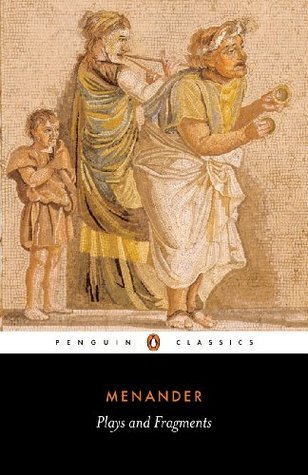What do you think?
Rate this book


276 pages, Kindle Edition
First published January 1, 317
প্রাচীন গ্রীক কমেডি নাটকগুলোকে বিষয়বস্তু, নাটকের স্বর, এবং সময়কাল অনুযায়ী ৩টি ভাগে ভাগ করেছেন পণ্ডিতেরাঃ ওল্ড কমেডি, মিডল কমেডি, এবং নিউ কমেডি। ওল্ড কমেডি এবং নিউ কমেডির মাঝে সময়ের পার্থক্য মেরেকেটে ২শ বছরের মতো। আজ থেকে প্রায় আড়াই হাজার বছর আগের গ্রীসে মূলতঃ কিছু রাজনৈতিক পরিবর্তনের হাত ধরেই প্রাচীন গ্রীক কমেডি নাটকের এই পরিবর্তনগুলো আসে। ওল্ড কমেডি লেখার চল যখন ছিলো, সেই খ্রীষ্টপূর্ব ৫ম শতকে পেলোপনেজিয়ান যুদ্ধের অবসান ঘটে; এথেন্স ও স্পার্টার মাঝে ২৭ বছর ধরে চলা এ যুদ্ধে এথেন্স পরাজিত হয়, যার ফলে এথেন্সে চর্চিত গণতন্ত্র বেশ অনেকটাই শেকলবদ্ধ হয়ে পড়ে। ওল্ড কমেডির অন্যতম বিশেষত্ব ছিলো ব্যক্তি আক্রমণ, যেটি পরবর্তী সময়ের নাটকে সেভাবে আর দেখা যায় না। ওল্ড কমেডি ঘরানার সবচেয়ে জাঁদরেল নাট্যকার হিসেবে আমরা আজ অ্যারিস্টোফেনেস-এর নাম জানি, যিনি সক্রেটিসকে ব্যঙ্গ করে ভাঁড়ামি-সর্বস্ব নাটক লিখেছেন, ইউরিপিদেস-এর নাটকের একরকম প্যারোডি সংস্করণ বানিয়েছেন, পেলোপনেজিয়ান যুদ্ধের বিরোধীতা করে হাসির নাটক লিখে রীতিমতো প্রপাগ্যান্ডাও চালিয়েছেন। অ্যারিস্টোফেনেস-এর সক্রেটিসকে নিয়ে লেখা ব্যাঙ্গাত্নক নাটকটিই শেষতক সক্রেটিসের বিচার এবং প্রাণদণ্ডের কারণ হয়ে দাঁড়ায় বলে অনেকে রায় দেন।
পেলোপনেজ-এর যুদ্ধে এথেন্স হেরে যাওয়ার পর ওল্ড কমেডিতে ব্যবহৃত অনেক কৌশলই পরবর্তীতে নাট্যকাররা এড়িয়ে যান তাঁদের নবধারার নাটকে। ব্যক্তিগত আক্রমণ বা সমাজের কোন ব্যক্তিবিশেষকে লক্ষ্য না বানিয়ে এবার তাঁরা মনোনিবেশ করেন বিবিধ সামাজিক বিষয়ের ওপর। এই নাটকগুলো এক একটা জানালার মতো কাজ করে; শার্সিতে চোখ রাখলে নিমিষেই যেন আড়াই হাজার বছর আগের একটা ছবি দেখে ফেলা যায়। তবে সে সময়ের অধিকাংশ, প্রায় ৯০ ভাগ কাজই ধ্বংস হয়ে গেছে এতগুলো বছরের পরিক্রমায়, তাই সে জানালাটা আকারে বেশ ছোটই বলা যায়। পণ্ডিতেরা ‘মিডল কমেডি’ বলে একটি ধারা চিহ্নিত করেছেন বটে, কিন্তু সে সময়ের একটি নাটকও আজ টিকে নেই। মূলত অ্যারিস্টোফেনেসের পর এবং মেনান্দারের আগ পর্যন্ত সময়টিকে মিডল কমেডির সময় বলে অভিহিত করা হয়। অ্যারিস্টোফেনেস যেমন ওল্ড কমেডির সর্বেসর্বা গুরু, নিউ কমেডির পালের গোদা তেমনি মেনান্দার। সাহিত্যের একটা ধারার মাইলফলকই আজ যিনি হয়ে পড়েছেন, তাঁকে পড়বার লোভ দীর্ঘদিন থেকেই ছিল, অবশেষে সেটা মেটানো গেলো!
মেনান্দার লিখেছিলেন ১০৮টির মতো নাটক, তার মাঝে পূর্ণাঙ্গ পরিসরে মাত্র একটি নাটকই আজ বেঁচে আছে, বাকী নাটকগুলোর কোনটির কয়েক পৃষ্ঠা, কোনটির কয়েক অনুচ্ছেদ, আর কোনটির কয়েক চরণ কেবল টিকে রয়েছে। মেনান্দারের যে একমাত্র নাটকটি আজ টিকে আছে (ডিস্কোলোস), সেটির ছায়ায় প্রাচীন রোমান নাট্যকার প্লটাস ও ফরাসী নাট্যকার মলিয়ের পরবর্তীতে নিজেরা নাটক লিখেছেন। তবে মেনান্দারের প্রভাব শুধু এই দু’জনের মাঝেই থেমে থাকেনি, হালের সময়ে টিভিতে আমরা যে সিচুয়েশনাল কমেডি সিরিজ বা চলচ্চিত্রগুলো দেখি, সেগুলোর বিভিন্ন দৃশ্যের সাথে মেনান্দারের নাটকের দৃশ্যের আশ্চর্য মিল পাওয়া যায়। সিটকমে সচরাচর বিভিন্ন বিভ্রান্তির ঘটনা দেখিয়ে হাসির উদ্রেক ঘটানো হয় (যমজ ভাইদের নিয়ে ভুল বোঝাবুঝি, অপরের স্ত্রীর সাথে কথা বলা নিয়ে বিভ্রান্তি ইত্যাদি)। দর্শক হাসাবার কাজে মেনান্দার এ ‘ডিভাইস’গুলোই বারবার ব্যবহার করেছেন তাঁর নাটকে। যে ধরণের চরিত্রগুলোকে আমরা সিটকমে ঘুরেফিরে দেখতে পাই, যাদের ‘স্টক ক্যারেক্টার’ বলা হয় (অর্থ্যাৎ, লেখক-পরিচালকের আস্তিনের তলায় স্টকে এমন কিছ চরিত্র মজুদ থাকেই, যখনই সিরিজের গতি ঝুলে যায়, কিংবা হাসির দৃশ্যের প্রয়োজন পড়ে, এ চরিত্ররা আস্তিনের তলা থেকে বেরিয়ে আসে), সেই চতুর মুখরা গৃহপরিচারিকা (টু অ্যান্ড আ হ্যাফ মেন), শ্বাশুড়ী ও কন্যা/ পুত্রবধূর যুগপৎভাবে গর্ভধারণ (ফাদার অফ দ্যা ব্রাইড), বোকা বোকা কথা বলা নায়কের বন্ধু (আম্মাজান চলচ্চিত্রে মান্নার সহচর ‘নবাব’ চরিত্রটি)-ইত্যাদির উৎস হিসেবে মেনান্দারকেই চিহ্নিত করা যায়।
মেনান্দারের পকেট থেকেই কি তবে এত এত সব ঘাঘু নাট্যকার-চিত্রনাট্যকারদের জন্ম? ব্যাপারটা ঠিক তেমনও নয়। মেনান্দারকে নিউ কমেডির প্রবর্তক বলে আমরা জানি বটে, কিন্তু তিনিও তাঁর পূর্বসুরীদের কাছ থেকে বেশ স্বাস্থ্যকর পরিমাণেই নাকি টুকলিফাই করতেন। কালের গর্ভে পূর্বসুরীদের সেসব লেখা হারিয়ে গেছে, তাই আজ আর জানবার উপায় নেই মেনান্দার আসলে কতটুকু কার কাছ থেকে মেরে দিয়েছেন। তবে একটি ব্যাপার স্পষ্ট হয়ে আসে, আড়াই হাজার বছর আগের প্রাচীন সেই গ্রীক সমাজই সভ্যতার শুরু নয়, এর আরো বহু হাজার হাজার বছর আগেই মানুষ তার সামাজিক জীবনের কাঠামোটি গড়ে নিয়েছিলো, যে ছকে আমরা আজও এই ২০২২ সালের জীবন যাপন করি। মেনান্দারের বেশ কয়েকটি নাটকের প্লটই আবর্তিত হয়েছে বিবাহ-বহির্ভূত ‘অবৈধ সন্তান’কে ঘিরে। সন্তানের বৈধতা/অবৈধতার যে মুখরোচক গপ্পে আমরা আজ মজি, সেটির আবেদন আড়াই হাজার বছর আগেও একইরকমই ছিলো।
মেনান্দার খুব সূক্ষ্মভাবে একরকম প্রপাগ্যান্ডা চালিয়েছেন; বিবাহ-বহির্ভূত সন্তানকে অবহেলা না করা, এবং তাকে স্বীকৃতী দেবার একটি আহবান শুনতে পাওয়া যায় দিব্যি। তবে সে সময়ের সাথে আমাদের সময়ের একটি বড় পার্থক্য রয়েছে; মেনান্দার তাঁর অনেকগুলো নাটকেই ধর্ষণকে কৌতুকের বিষয় বানিয়েছেন, অনেকটা যেমন বিগত দশকগুলোতে সমকামীদের কৌতুকের বিষয় বানিয়ে পাঠক/ দর্শককে হাসাবার চেষ্���া করা হতো। এক সময়ের সামাজিক প্রথার মূল্যায়ণ আরেক সময়ে বসে করা যায় না, সত্যিই, তবে বারবার ধর্ষণ বিষয়ক সংলাপ এবং গল্প পড়াটা আজকের দিনে খুব সুখকর কিছু নয়। এ নাটকগুলোর কোনটিই পূর্ণাঙ্গ আকারে টিকে নেই আগেই বলেছি, ২-৩ পাতা পড়বার পরই সে নাটক শেষ হয়ে গেছে, তাই ধর্ষণের ব্যাপারে মেনান্দারের নিজের দৃষ্টিভঙ্গির পরিচয় খুব একটা পাওয়া যায় না।
প্লুতার্ক মেনান্দারকে খুব উঁচুদরের নাট্যকার বলে গণ্য করতেন, আর অ্যারিস্টোফেনেসকে নাকি ধর্তব্যই মনে করতেন না। প্লেটোর একনিষ্ঠ ভক্ত প্লুতার্ক সক্রেটিসের মৃত্যুর পেছনে প্রচ্ছনভাবে দায়ী অ্যারিস্টোফেনেস-এর ওপর চটে থাকবেন সেটাই স্বাভাবিক। প্লুতার্কের এ মূল্যায়ণ কতটুকু যৌক্তিক সেটি আজকের দিনে নিরুপণ করা অসম্ভব, তবে প্লুতার্ককে আমি ওস্তাদ মান্য করি। হলিউডের চোখা চোখা উইটি সংলাপের আড়ালে মেনান্দার যে লুকিয়ে আছেন সেটি আমি জেনে ফেলেছি এখন, আমার ধারণা প্লুতার্ক এটি দু’হাজার বছর আগেই জেনে বসেছিলেন!